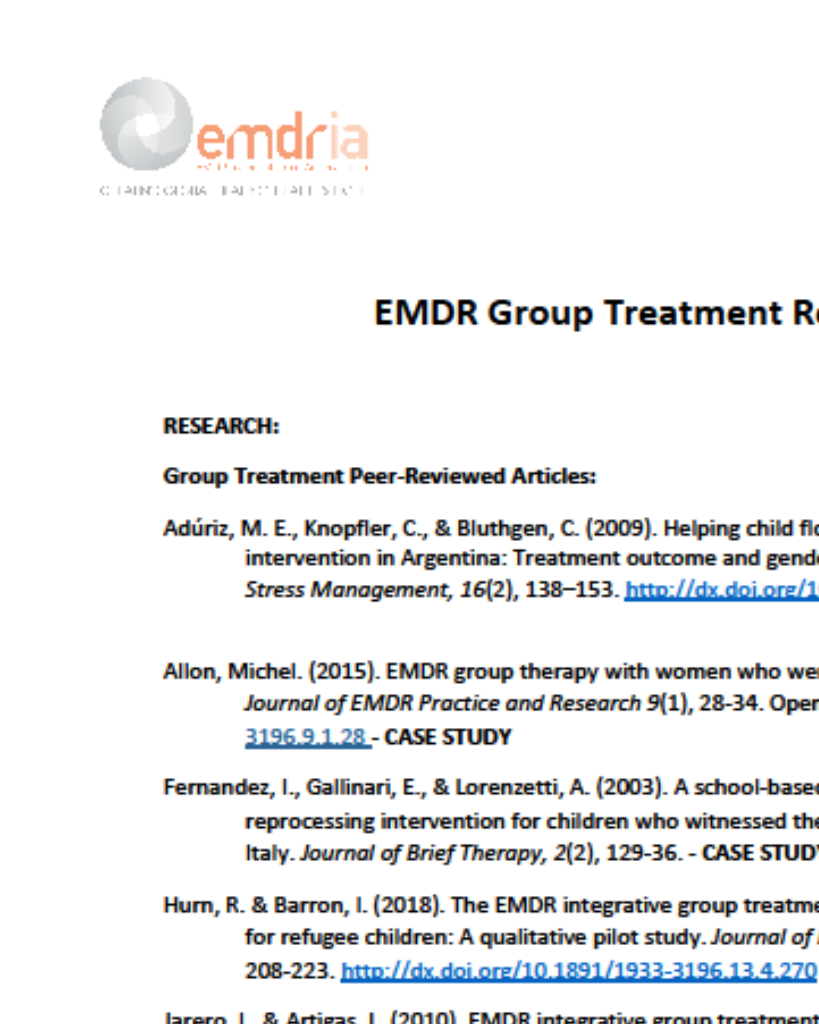An EMDR group intervention for Syrian refugees with post-traumatic stress symptoms: Results of a randomized controlled trial
Efficacy of EMDR G-TEP in treating post-trauma symptoms and depression and preventing chronic PTSD among refugees in a refugee camp.
Article Abstract
“The number of refugees has increased significantly over the past few years. PTSD and depression are among the most common mental health problems among refugees. Eye Movement Desensitization and Reprocessing (EMDR), an effective treatment for PTSD, is usually administered individually. The availability of mental health resources would be greatly enhanced when EMDR can be delivered to groups. The EMDR G-TEP is a group protocol based on Early EMDR intervention protocols. There is clinical evidence and one field study published on the effect of EMDR G-TEP and there is only one RCT published on the treatment of PTSD and depression in a refugee camp. The aim of our study was to investigate the efficacy of EMDR G-TEP in treating post-trauma symptoms and depression and preventing the development of chronic PTSD among refugees living in a refugee camp. 47 adult participants with PTSD symptoms were randomly allocated to experimental (n = 18) and control (n = 29) groups. We measured Impact of Event Scale (IES-R), Beck Depression Inventory-II (BDI-II) and International Neuropsychiatric Interview (MINI) at pre-, post- and 4-week follow-up. Analysis of the results showed that the EMDR G-TEP group had significantly lower PTSD and depression symptoms after intervention. The percentage of PTSD diagnosis decreased from 100 to 38.9% in the EMDR G-TEP group and was unchanged in the control group. Following the EMDR G-TEP intervention 61.1% of the experimental group no longer had a PTSD diagnosis; this decrease was maintained at 4 weeks follow-up. In the control group the percentage of people who no longer met the diagnostic criteria for PTSD was 10.3% post-test and 6.9% at 4 weeks follow-up. A significant decrease in depression symptoms from pre-test levels was found in EMDR group but not in the control group follow up-test. This study indicated that EMDR G-TEP effectively reduced PTSD symptoms among refugees living in a camp, after two treatment sessions conducted over a period of 3 days. Further studies need to be performed using a larger number of participants, followed for a longer period of time and given more treatment sessions to strengthen our findings.”
—Description from publisher
Article Access
Open Access
Yurtsever, A., Konuk, E., Akyuz, T., Zat, Z., Tukel, F., Cetinkaya, M. etal. (2018). An EMDR group intervention for Syrian refugees with post-traumatic stress symptoms: Results of a randomized controlled trial. Frontiers in Psychology, 9, 493. Open access: https://doi.org/10.3389/fpsyg.2018.00493
Date
June 12, 2018
Creator(s)
Asena Yurtsever, Emre Konuk, Tuba Akyüz
Contributor(s)
Zeynep Zat, Feryal Tükel, Mustafa Çetinkaya, Canan Savran, Elan Shapiro
Topics
PTSD
Client Population
Immigrants/Refugees
Practice & Methods
Group
Extent
8 pages
Publisher
Frontiers
Rights
Copyright © 2018 Yurtsever, Konuk, Akyüz, Zat, Tükel, Çetinkaya, Savran and Shapiro. This is an open-access article distributed under the terms of the Creative Commons Attribution License (CC BY). The use, distribution or reproduction in other forums is permitted, provided the original author(s) and the copyright owner are credited and that the original publication in this journal is cited, in accordance with accepted academic practice. No use, distribution or reproduction is permitted which does not comply with these terms.
APA Citation
Yurtsever, A., Konuk, E., Akyuz, T., Zat, Z., Tukel, F., Cetinkaya, M. etal. (2018). An EMDR group intervention for Syrian refugees with post-traumatic stress symptoms: Results of a randomized controlled trial. Frontiers in Psychology, 9, 493. Open access: https://doi.org/10.3389/fpsyg.2018.00493
Audience
EMDR Therapists, Other Mental Health Professionals
Language
English
Content Type
Article, Peer-Reviewed, RCT
Access Type
External Resource, Open Access





